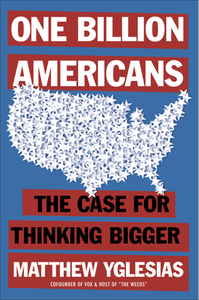Take a photo of a barcode or cover
One of my favorite writers and commentators laying out many of his best ideas. America has long been bigger than other rich powers and richer than other big powers, but that won't be true soon. Let's keep brain draining the best and brightest here - and making it easier for Americans to have more kids. Population is power and we should be recognizing that- as our past leaders have almost always recognized.
I enjoy Matt’s writing and insight, but this left me slightly underwhelmed. It’s a hodgepodge of policy prescriptions tied together by an argument for American greatness that seems more attuned to convincing conservatives to increase immigration and expand the welfare state.
I hope it’s successful in that regard, but the book’s rapid-fire pace made me wish Matt had taken more time or done a deep dive into immigration, urban or natalist policies with some original reporting (and the last may have been the most valuable as the first two have received a lot of attention).
What we end up with isn’t bad, but it feels superficial and at times underbaked.
I hope it’s successful in that regard, but the book’s rapid-fire pace made me wish Matt had taken more time or done a deep dive into immigration, urban or natalist policies with some original reporting (and the last may have been the most valuable as the first two have received a lot of attention).
What we end up with isn’t bad, but it feels superficial and at times underbaked.
hopeful
informative
fast-paced
This book argues that for decades Americans have being thinking way too small and the best way to ensure prosperity is to massively increase the population through pro-family policies and immigration.
A lot of what is needed to get the USA able to support one billion Americans are things we need now, more affordable housing, better mass transportation, and a more progressive tax policy.
A lot of what is needed to get the USA able to support one billion Americans are things we need now, more affordable housing, better mass transportation, and a more progressive tax policy.
This book was super interesting, and came in a book bundle from my favorite ladies at Pantsuit Politics. Their book club is quarterly and really challenges me to read books I would never have considered. Matthew Yglesias is the co-founder of Vox, and he makes the argument in this book that what would actually make America great again is more people. He argues that a static or diminished population hurts America in the global market, and could eventually hurt our standing as a world leader. I found the book and his ideas extremely interesting and something to certainly think about. He discusses everything from birth rates to child care to immigration to infrastructure and the key role all of these things (and more) play in establishing an innovative and economically prosperous superpower. My two weakest areas of understanding, politically speaking, are probably economics and foreign policy. It's been a goal of mine to increase my knowledge and understanding in these two critical areas. I don't have answers, but I'm all about new and fresh ideas to increasingly bigger and more complex problems. I think we tend to make things harder than they need to be, and we are quick to dismiss alternative viewpoints. I just want to live in a better and kinder world.
Optimistic, uplifting, extremely clear-minded and rigorous; the author has clearly taken the project of "how do we build a better, more-inclusive America" more seriously. Definitely the right book to read before an election!
It's...fine. There's a lot I like about it and a fair bit I don't.
On the positive side, there are a lot of policy ideas, not a lot of platitudes, and Yglesias has clearly shown that he's actually interested in trying to persuade conservatives. Conversation between people who disagree is something we desperately need, and this is part of that. Some of his policy ideas are intriguing, especially in the immigration sphere. Other times I disagree strongly with his policy solutions, but he makes good points about the problems (like the gap between how many children women say that want and actually want, plus some interesting points about infrastructure and transportation).
But on the negative side, the book does a lot of wandering in the back half, and at times seems kind of disconnected from the book's central thesis (which is one I'm sympathetic to). And while the policy solutions are interesting, I'm extremely skeptical that these kinds of solutions will make the culture changes that are needed for this kind of change. He addresses that to some degree, but insufficiently in my opinion.
But I liked it more than I didn't. It has an intriguing thesis, and Yglesias remains one of my favorite left-of-center people to listen to.
On the positive side, there are a lot of policy ideas, not a lot of platitudes, and Yglesias has clearly shown that he's actually interested in trying to persuade conservatives. Conversation between people who disagree is something we desperately need, and this is part of that. Some of his policy ideas are intriguing, especially in the immigration sphere. Other times I disagree strongly with his policy solutions, but he makes good points about the problems (like the gap between how many children women say that want and actually want, plus some interesting points about infrastructure and transportation).
But on the negative side, the book does a lot of wandering in the back half, and at times seems kind of disconnected from the book's central thesis (which is one I'm sympathetic to). And while the policy solutions are interesting, I'm extremely skeptical that these kinds of solutions will make the culture changes that are needed for this kind of change. He addresses that to some degree, but insufficiently in my opinion.
But I liked it more than I didn't. It has an intriguing thesis, and Yglesias remains one of my favorite left-of-center people to listen to.
As a long time ‘Weeds’ listener I wasn’t surprised that Yglesias would pick a provocative title to serve as a basis for a discussion of immigration on steroids and a host of tangential policy ideas related to population increase. In effect, throwing out left field policy hot takes is his bread and butter every week. However, I was a little disappointed that the book was a bit thin both in depth and quite frankly in quality at times – I suppose the bar was set a bit too high (and it’s only about the length of six Weeds episodes). Needless to say, the main topic is theoretical at best as neither of the major parties would take up such an idea, although perhaps the idea and other policy proposals will seed idea generation at think tanks which wouldn’t be a bad thing. But in spite of setting the bar too high this was still a very engaging read.
Short review: there is some refreshing big-picture political thinking here, but the book ultimately presents a series of very thin policy sketches. It feels like an especially long and wide-ranging Vox article and left me wanting quite a bit more rigor.
This book is premised on one basic fact and one resulting argument: the United States is far less densely populated than almost every other advanced economy in the world, and it would be in a lot of peoples’ best interests (both prospective immigrants and existing U.S. citizens alike) to adopt a national policy of vastly scaling up the national population.
Some of the discussion around this gets quite interesting. For example, Yglesias takes us on a tour of the DOZENS of large U.S. cities that are a) far below their historical peak in population, and b) struggling to maintain city budgets and keep the doors of local institutions open as a result. Taking St. Louis as an example, the city’s built infrastructure reflects its historical population peak in 1950 of almost a million people (about 860,000) living within the city limits. Today, only about 280,000 residents remain. Some of these cities are the familiar suspects (Detroit, St. Louis), but Yglesias provides a good reminder that there are TONS of less-reported-on, mid-sized cities experiencing the same scale of population decline (Buffalo, Gary, Syracuse, Akron, you name it). What would it look like to adopt a coordinated national policy of repopulating and densifying these cities? What tools would be available for such a project?
Two of the tools that were most interesting to me were city-specific immigration work visas & government incentives for industry clustering. On the former, Yglesias muses about creating a new type of work visa for highly-skilled immigrants that is city-specific and fast-tracks legal permanent residency. Like, what if there was a fast-track visa program that invited highly skilled engineers to come to the United States on the condition that they spend at least five years working in Detroit? What opportunities would that create for those immigrants, for the city, for the community, for the local economy? It’s an interesting question that I am not qualified to answer, but I would be curious to read more after first introduction to the concept. The second idea basically imagines the federal government taking anti-trust-like actions to break up the high concentration of opportunity in a few massive coastal cities so that it can be more easily distributed across the country. For example, what actions could the federal government take such that the tech industry would become more multi-polar than JUST Silicon Valley? With the right interventions and incentives, why couldn’t Lincoln, or Albuquerque, or Birmingham share in that wealth?
It’s a bit frustrating that Yglesias introduces interesting ideas like these and then leaves them only partially assembled. But in a contemporary political landscape with such constrained imagination, it’s still refreshing to read about big, hopeful ideas. One final complaint I would lodge is that Yglesias does a bunch of needless flag waving at the beginning of the book about why “America is Number 1” and must always remain that way, how U.S. population growth would help to contain China or whatever. The book really didn’t need that. I was relieved that it was quickly over so that I could move onto to the ideas that actually interested me in the book.
In sum at the end of a long review: it was refreshing to read about a big-picture, pro-immigrant, forward-thinking vision for American politics, even if the end result was at times a bit under-baked.
This book is premised on one basic fact and one resulting argument: the United States is far less densely populated than almost every other advanced economy in the world, and it would be in a lot of peoples’ best interests (both prospective immigrants and existing U.S. citizens alike) to adopt a national policy of vastly scaling up the national population.
Some of the discussion around this gets quite interesting. For example, Yglesias takes us on a tour of the DOZENS of large U.S. cities that are a) far below their historical peak in population, and b) struggling to maintain city budgets and keep the doors of local institutions open as a result. Taking St. Louis as an example, the city’s built infrastructure reflects its historical population peak in 1950 of almost a million people (about 860,000) living within the city limits. Today, only about 280,000 residents remain. Some of these cities are the familiar suspects (Detroit, St. Louis), but Yglesias provides a good reminder that there are TONS of less-reported-on, mid-sized cities experiencing the same scale of population decline (Buffalo, Gary, Syracuse, Akron, you name it). What would it look like to adopt a coordinated national policy of repopulating and densifying these cities? What tools would be available for such a project?
Two of the tools that were most interesting to me were city-specific immigration work visas & government incentives for industry clustering. On the former, Yglesias muses about creating a new type of work visa for highly-skilled immigrants that is city-specific and fast-tracks legal permanent residency. Like, what if there was a fast-track visa program that invited highly skilled engineers to come to the United States on the condition that they spend at least five years working in Detroit? What opportunities would that create for those immigrants, for the city, for the community, for the local economy? It’s an interesting question that I am not qualified to answer, but I would be curious to read more after first introduction to the concept. The second idea basically imagines the federal government taking anti-trust-like actions to break up the high concentration of opportunity in a few massive coastal cities so that it can be more easily distributed across the country. For example, what actions could the federal government take such that the tech industry would become more multi-polar than JUST Silicon Valley? With the right interventions and incentives, why couldn’t Lincoln, or Albuquerque, or Birmingham share in that wealth?
It’s a bit frustrating that Yglesias introduces interesting ideas like these and then leaves them only partially assembled. But in a contemporary political landscape with such constrained imagination, it’s still refreshing to read about big, hopeful ideas. One final complaint I would lodge is that Yglesias does a bunch of needless flag waving at the beginning of the book about why “America is Number 1” and must always remain that way, how U.S. population growth would help to contain China or whatever. The book really didn’t need that. I was relieved that it was quickly over so that I could move onto to the ideas that actually interested me in the book.
In sum at the end of a long review: it was refreshing to read about a big-picture, pro-immigrant, forward-thinking vision for American politics, even if the end result was at times a bit under-baked.




